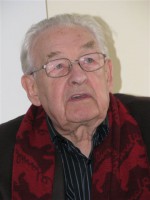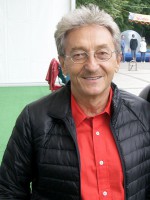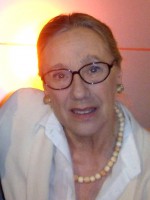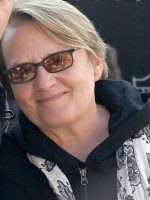Krystyna Zachwatowicz-Wajda is a Actor, Casting and Costume Design Polonaise born on 16 may 1930 at Warsaw (Pologne)
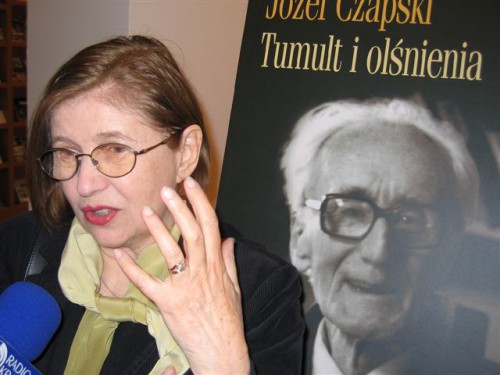
Krystyna Zachwatowicz-Wajda (born 1930), born Krystyna Zachwatowicz, is a Polish scenographer, costume designer and actress. She is a daughter of architect and restorer Jan Zachwatowicz and Maria Chodźko h. Kościesza, and wife of film director Andrzej Wajda. Member of the Polish Film Academy. She is a co-founder (with A. Wajda) of Centre of Japanese Art and Technology "Manggha" in Kraków.
From 1958 to 1970s Zachwatowicz was an actress of Kraków's Piwnica pod Baranami, where she created a legendary portrait of "the first naive" (Polish: pierwsza naiwna). She cooperated with other theatres in Poland such as: The Groteska Puppet, Mask and Actor Theatre and The Ludowy Theatre in Kraków; with Dramatyczny Theatre and Polish Theatre in Warsaw, and in Wrocław with Polish Theatre.
Source : Wikidata
Krystyna Zachwatowicz-Wajda

Biography
Zachwatowicz was born on 16 May 1930 in Warsaw, Poland. She graduated from the History of Art Faculty of the Jagiellonian University in Kraków (1952) and Scenography faculty of the Academy of Fine Arts in Kraków (1958). In 1958 she made her own debut as a scenographer in Marin Držić's Rzymska kurtyzana on the stage of Teatr Zagłębia in Sosnowiec. In 1960 she moved to Sosnowiec, where she was associated with student's theatre of the Silesian University of Technology in Gliwice. There, she designed a scenography to Witold Gombrowicz's The Marriage (Polish: Ślub) directed by Jerzy Jarocki. Zachwatowicz cooperated with Jarocki also in other theatre productions: Stanisław Ignacy Witkiewicz's The Mother (1964, 1972; Polish: Matka) and The Shoemakers (1971; Polish: Szewcy) at The Old Theatre in Kraków. In The Old Theatre she made set designs to several performances directed by Konrad Swinarski, i.e.: Zygmunt Krasiński's The Un-Divine Comedy (1965; Polish: Nie-Boska Komedia), William Shakespeare's A Midsummer Night's Dream (1970) and to plays directed by Andrzej Wajda: Stanisław Wyspiański's November Night (1974; Polish: Noc listopadowa), Fyodor Dostoevsky's Crime and Punishment (1984), and William Shakespeare's Hamlet IV (1989).From 1958 to 1970s Zachwatowicz was an actress of Kraków's Piwnica pod Baranami, where she created a legendary portrait of "the first naive" (Polish: pierwsza naiwna). She cooperated with other theatres in Poland such as: The Groteska Puppet, Mask and Actor Theatre and The Ludowy Theatre in Kraków; with Dramatyczny Theatre and Polish Theatre in Warsaw, and in Wrocław with Polish Theatre.
Usually with
Filmography of Krystyna Zachwatowicz-Wajda (12 films)
Actress

Katyn (2007)
, 1h58Directed by Andrzej Wajda
Origin Pologne
Genres Drama, War, Historical
Themes Politique, Prison films, Political films
Actors Maja Ostaszewska, Andrzej Chyra, Danuta Stenka, Paweł Małaszyński, Wiktoria Gąsiewska, Wiktoria Gąsiewska
Roles Mrs. Greta
Rating69%





The events of Katyn are relayed through the eyes of the women, the mothers, wives, and daughters of the victims executed on Stalin's orders by the NKVD in 1940.

Pan Tadeusz (1999)
, 2h27Directed by Andrzej Wajda
Genres Drama, War, Historical, Romance
Themes Histoire de France, Napoleonic Wars films
Actors Bogusław Linda, Alicja Bachleda-Curuś, Jerzy Bińczycki, Daniel Olbrychski, Grażyna Szapołowska, Andrzej Seweryn
Rating60%





Pan Tadeusz is told in flashbacks as the author, Adam Mickiewicz, reads his work to a group of elderly exiles in Paris. The story takes place over the course of five days in 1811 and one day in 1812 in rolling landscapes of Lithuania inhabited by Poles whose homeland has been recently partitioned among Russia, the Austrian Empire and Prussia. Not far off in history looms Napoleon's invasion of Russia, the prospect of which heartens Poles yearning for liberation. But more immediately, the characters in Pan Tadeusz are feuding among themselves.
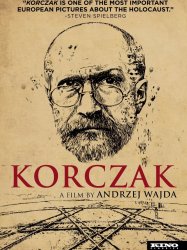
Korczak (1990)
, 1h55Directed by Andrzej Wajda
Origin Pologne
Genres Drama, War, Biography, Historical
Themes Films about religion, Political films, Films about Jews and Judaism
Actors Wojciech Pszoniak, Aleksander Bardini, Ewa Dałkowska, Anna Mucha, Agnieszka Krukówna, Teresa Budzisz-Krzyżanowska
Roles Szloma's mother
Rating73%





Le film se passe pendant la Seconde Guerre mondiale, en 1942, dans le ghetto de Varsovie. Janusz Korczak a la charge de plusieurs centaines d'orphelins : il doit subvenir à leurs besoins dans des conditions très difficiles. On peut voir, par exemple, sur des photos d'époque prises dans ces orphelinats, que les enfants étaient pieds nus.
 , 1h55
, 1h55Directed by Andrzej Wajda
Origin Pologne
Genres Drama
Themes Political films
Actors Gabriela Kownacka, Tadeusz Łomnicki, Krystyna Zachwatowicz-Wajda, Joanna Szczepkowska, Leonard Pietraszak, Beata Poźniak
Roles Witek's Mother
Rating66%





À la veille de la Seconde Guerre mondiale, deux adolescents polonais Witek et Alina, de condition sociale éloignée s'éprennent l'un de l'autre.
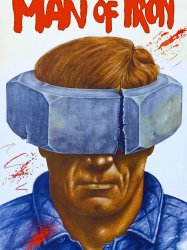
Man of Iron (1981)
, 2h20Directed by Andrzej Wajda
Origin Pologne
Genres Drama, Historical
Themes Films about the labor movement, Political films
Actors Jerzy Radziwiłowicz, Krystyna Janda, Bogusław Linda, Artur Barciś, Marian Opania, Andrzej Seweryn
Roles Hanka Tomczyk, żona Birkuta
Rating72%





The film is set in Gdansk in 1980. In Gdansk shipyard workers strike continues. Among them, an important role is played by activist Strike Committee, Maciek Tomczyk (played by Jerzy Radziwiłowicz). Radio journalist, editor Winkel (Marian Opania) is ordered by the deputy chairman of Radio Committee (Janusz Gajos) to achieve coverage compromising Tomczyk. Is sent to Gdansk, where a representative of the authorities Badecki (Franciszek Trzeciak) realizes the importance of his job.
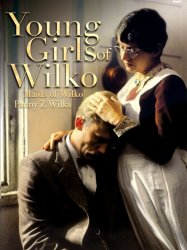
The Maids of Wilko (1979)
, 1h58Directed by Andrzej Wajda
Origin Pologne
Genres Drama, Romance
Actors Daniel Olbrychski, Anna Seniuk, Maja Komorowska, Stanisława Celińska, Krystyna Zachwatowicz-Wajda, Christine Pascal
Roles Kazia
Rating73%





At the age of 40, Wiktor Ruben (Daniel Olbrychski) returns to the family property (Wilko) where he'd spent his late teens/early twenties as a tutor of young sisters. Now they are all women - mostly wives and mothers. Wiktor discovers that Fela, once the closest to him, is now dead for some time and other sisters aren't too keen to talk about her and her grave is rather forgotten. He is also disappointed with how all the women have changed. Julia (Anna Seniuk), now a mother of two, doesn't resemble his first object of love and desire she once was and doesn't show him an affection he might expected. Jola (Maja Komorowska), seemingly unhappy in her marriage, chases him and makes fun of it, until he doesn't bring the painful memories of the past. Kazia (Krystyna Zachwatowicz), a divorcee - thus treated like less worthy than others - is the most demanding partner of his intellectual reflections while Zosia (Stanisława Celińska) is - as always - distant and outspoken. That leaves him with Tunia (Christine Pascal) who was only a child when he previously knew her but now resembles Fela. Wiktor spends time in Wilko but isn't able to see that his return restored once forgotten dreams and hopes of the sisters.

Man of Marble (1977)
, 2h40Directed by Andrzej Wajda
Origin Pologne
Genres Drama, Historical
Themes Political films
Actors Krystyna Janda, Jerzy Radziwiłowicz, Tadeusz Łomnicki, Krystyna Zachwatowicz-Wajda, Kazimierz Kaczor, Ewa Ziętek
Roles Hanka Tomczyk
Rating76%





Agnieszka, is a young filmmaker who is making her film thesis on Mateusz Birkut, a bricklayer elevated as a hero in a stunt to increase construction efficiency and brick quotas. However, who has since had a fall from grace of the Party and other officials. His current whereabouts seem to have been lost two decades later, and she attempts to piece together the details of his downfall. Agnieszka has difficulty making the film from archival sources and museum collections, but little work remains outside of official propaganda.

Samson (1961)
, 1h57Directed by Andrzej Wajda, Andrzej Żuławski
Origin Pologne
Genres Drama, War, Adventure, Romance
Themes Films about religion, Political films, Films based on the Bible, Films about Jews and Judaism
Actors Serge Merlin, Beata Tyszkiewicz, Alina Janowska, Elżbieta Kępińska, Tadeusz Bartosik, Roman Polanski
Roles Wiska
Rating62%





A dark coming-of-age film, Samson follows its Jewish protagonist (Serge Merlin) from an anti-Semitic private school to a prison, then into a Jewish ghetto, and finally over the ghetto wall to the outside world. Wajda uses this journey as a means to explore expressionist cinematography and the weighty issues facing the Jewish people.
Production

A Love in Germany (1983)
, 2h12Directed by Andrzej Wajda
Origin German
Genres Drama
Themes Films about sexuality, Political films
Actors Hanna Schygulla, Armin Mueller-Stahl, Ralf Wolter, Daniel Olbrychski, Marie-Christine Barrault, Bernhard Wicki
Roles Casting
Rating65%





The story takes place in a little German town at the border to Switzerland. The owner of the local fruit-and-vegetables shop has been called up. His shop has a key function for the town's supply situation. His customers know from World War I how rationing can make the owner of such a shop very rich if only he's egoistic enough to get corrupted by well-heeled customers who don't care whether their poorer country fellowmen's families starve. So when his wife Paulina starts to run the shop alone, her character is subsequently of public interest for all citizens who are concerned about the well-being of their families during the ongoing war. Paulina shares the fate of other soldier's wives who constantly face the fear her husband might return crippled, maimed or not at all. But because her husband's shop is highly important for the town's community, she gets somebody who can ease her working load. She is also luckier than other women for she is still young and attractive. So is the prisoner of war named Stanislaus who must serve her. She obviously finds him handsome and relishes that he has to obey all her commands. So she decides she doesn't need to be one of the lonesome wives anymore. When she seduces him she finds him very virile and they sometimes celebrate their love even literally in the open. Finally a town's official informs her that her evident bliss leads other women to doubts about her integrity. Still she doesn't let go of her love affair although the town official keeps on warning her that under the prevailing Nazi laws her adultery is punishable as "Rassenschande". Paulina keeps on putting the Polish POW in lethal danger until he is finally taken to court and sentenced to death. Paulina is imprisoned for two years. Decades later her son and her grandson visit the still existing little town in order to confront the man who warned Paulina repeatedly but in the end let her go down. The both of them are appalled when they realise he still lives in the very town where the citizens forced him to take action on Paulina and he doesn't hide.
Costume and makup
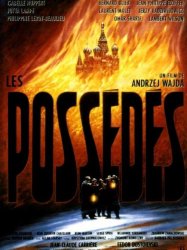
The Possessed (1988)
, 1h56Directed by Andrzej Wajda
Origin France
Genres Drama, Thriller, Historical
Actors Isabelle Huppert, Bernard Blier, Philippine Leroy-Beaulieu, Laurent Malet, Jerzy Radziwiłowicz, Jean-Philippe Écoffey
Roles Costume Design
Rating62%





Ce film s'inspire du roman éponyme de Fiodor Dostoïevski, montrant les fondements révolutionnaires de la Russie de la fin du siècle, en prise avec ses démons. Vers 1870, un groupe de révolutionnaires nihilistes souhaite détruire la société traditionnelle russe par des actions terroristes. Mais des tensions vont naître entre eux avec l'arrivée de leur chef : Stavroguine.

The Shadow-Line (1976)
, 1h40Directed by Andrzej Wajda
Origin Pologne
Genres Drama
Actors Marek Kondrat, Tom Wilkinson, Bernard Archard, John Bennett, Martin Wyldeck, Stanisław Tym
Roles Costume Design
Rating61%






The Wedding (1973)
, 1h42Directed by Andrzej Wajda
Origin Pologne
Genres Drama
Themes Théâtre, Films based on plays
Actors Daniel Olbrychski, Ewa Ziętek, Andrzej Łapicki, Wojciech Pszoniak, Franciszek Pieczka, Marek Perepeczko
Roles Costume Design
Rating69%





A poet marries a peasant girl. Their wedding reception follows. The celebration of the new marriage moves on from the church to the villager's house. In the rooms adjoining that of the wedding party, guests continually burst into arguments, make love, or simply rest from their merriment, dancing and feasting. Interspersed with the real guests are the well-known figures of Polish history and culture, who represent the guilty consciences of the characters. The two groups gradually begin a series of dialogues. The Poet (played by Andrzej Łapicki) is visited successively by the Black Knight, a symbol of the nation's past military glory; the Journalist (played by Wojciech Pszoniak), then by the court jester and conservative political sage Stańczyk; and the Ghost of Wernyhora (Marek Walczewski), a paradigm of leadership for Poland. Wernyhora presents the Host with a golden horn symbolizing the national mission, and calls the Polish people to a revolt. One of the farm hands is dispatched to sound the horn at each corner of Poland, but he loses the horn soon after.
 Connection
Connection
